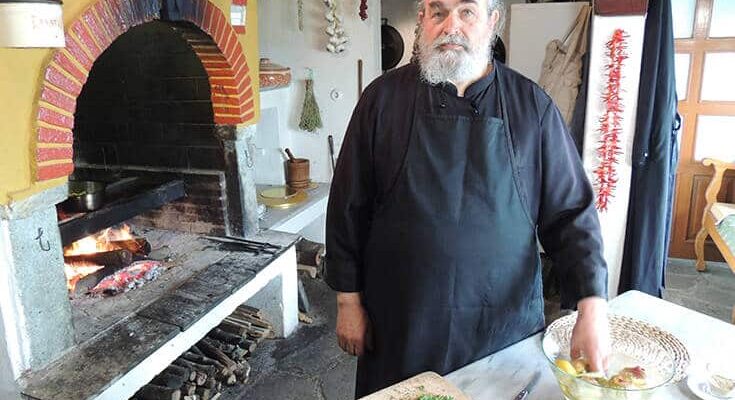
Father Epiphanios of Mylopotamos was the Greek monk who first brought Holy Mount Athos cuisine to the world.
The author of the book “The Cuisine of Holy Mount Athos” made monastic cooking, based mostly on fish and legumes, an important addition to the healthy Mediterranean diet, and very popular in its own right.
The book, which contains 126 recipes prepared by Mount Athos monks, has been translated into English, Spanish, German, Russian, Romanian, and Bulgarian.
Epiphanios, an excellent cook by any measure even outside monastery walls, had traveled all over Greece and Europe, bringing his ideas, expertise, and recipes to Britain, France, Spain, Italy, and beyond and winning international distinction.
Well-known chefs have invited him into their kitchens to learn culinary techniques and ingredients from the man of God.
The Mount Athos monk was a skilled winemaker as well, producing exquisite wines from his vineyard at Mylopotamos, a dependency of the Holy Monastery of Megiste Lavra.
His Mylopotamos wines, which have also won international awards, have been exported to several countries around the world. Epiphanios also produced his own olive oil.
The son of a winemaker, the polymath monk was born in Nikisiani, located in Kavala in northern Greece, in 1956. His father had a sizeable vineyard in an area that has been renowned for its wine production since ancient times.
Έφυγε από την ζωή ο Γέροντας Επιφανιος ο αρχιμάγειρας του Αγίου Ορους, σε ηλικία 64 ετών ύστερα από πολύχρονη μάχη με τον καρκίνο…. Αναπαύσου εν ειρήνη!! pic.twitter.com/ejQqguFwZ6
— legend (@legend_74_) December 11, 2020
The Greek monk Epiphanios and the Holy Mount Athos cuisine
Since Greek Orthodox monks at Athos are not allowed any meat, they subsist mainly on legumes and vegetables, while they are able to consume fish on Orthodox holidays.
However, as Epiphanios has explained in interviews, the fasting limitations only served to turn him into a much more inventive chef. Perhaps the most challenging of all, however, is that for about 200 days per year, the Orthodox are not even allowed the consumption of olive oil. Hence, monks continually alternate between fasting and non-fasting foods.
Since all monasteries cultivate their own organic vegetables, herbs, and fruits, the staple ingredients are of the highest quality. Additionally, Epiphanios also uses fennel, parsley, mint, red pepper, cinnamon, allspice and cumin in most of his recipes for added flavor.
While fish is reserved for Easter and other Christian holidays, for the most part, monks subsist on vegetables, pasta, fruit, grains and other types of seafood, such as octopus. Once again, the seafood limitations often spark the creation of original recipes.
Another secret of Mount Athos cuisine is slow cooking in stone ovens using wood or even cooking directly over open fires. There is no real need to rush the cooking procedures because, after all, monks have all the time in the world to prepare a meal.
According to Epiphanios, good food takes time to prepare.
The benefits of monastic cooking are invaluable. Alternating between fasting and non-fasting foods allows the entire body to rest and to absorb all the nutrients. Diseases that are associated with excesses of diets are rare on Mount Athos.
Intestinal or stomach cancers are very rare among monks while heart diseases and strokes are even rarer.
Greek Orthodox monk Epiphanios and Mylopotamos
Epiphanios visited Mylopotamos in Mount Athos in 1990 after spending a year at the Monastery of Saint Catherine in the Sinai.
He acquired lifetime ownership of Mylopotamos from the Holy Monastery of Megiste Lavra for 2 million drachmas, or roughly 6,000 euros. He was allowed to not only build on site but also be responsible for its maintenance, restoration, and upkeep.
Once there, he invested a great deal of time and energy into restoring the wonderful Byzantine complex of Mylopotamos, which had been burned in a fire. The monk literally brought the monastery back to life.
The vineyard adjacent to the sea, which yields the marvelous Mylopotamos wines, surrounds the complex and boasts a state-of-the-art winery. The dependency also has an impressive library, with 4,000 ecclesiastical books, manuscripts, and works by modern writers and historians.
Epiphanios passed away in December 2020 at the age of 64, after a long battle with cancer.



